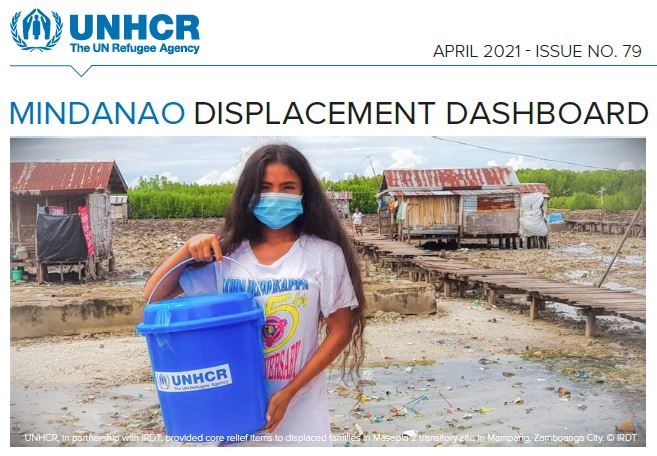Mindanao Displacement Dashboard, April 2021
In April 2021, an estimate total number of 984 families (approximately 4,886 individuals) were displaced in Mindanao due to armed conflict. Out of the 984 families displaced throughout the month, 10.37% (102 families) have returned to their places of origin by the end of April, leaving 89.63% (882 families or approximately 4,410 individuals) still displaced by the end of the reporting period. As of the 30th of April, a total number of 57,869 families (approximately 266,909 individuals) are currently displaced in Mindanao.
Meanwhile, UNHCR participated in the joint meeting with the Maguindanao Emergency Operations Center (EOC)/ Incident Management Team and the Mindanao Humanitarian Team on 15 April 2021 via Zoom. It was also attended by MSSD BARMM and representatives from various member agencies of the Humanitarian Country Team. Updates on the displacement situation in Maguindanao, the plans of the government for the IDPs who are returning to their homes, as well as those who will remain in the displacement sites, and the briefer on the “Agila Haven Program”- a peace-building process coupled with compassionate approach in view of the community transformation in terms of peace, clan war and violent extremism- were discussed during the meeting. Action points include the decommissioning of Incident Command Post (ICP) in Datu Saudi Ampatuan Municipality given the closure of the majority of the evacuation centers on 16 April, and the continuous monitoring of rural health units for the health status of the displaced families.
With the planned disengagement in 2022, UNHCR in the field conducted series of bilateral meetings virtually with OCHA, UNDP, and WFP on 13-15 April to understand their current operational priorities and explore opportunities for collaboration. OCHA shared their best practices and lessons learned on disengagement as they have transitioned to becoming a Humanitarian Advisory Team. UNDP, on the other hand, shared their current reports with the Ministry of the Interior Local and Government in strengthening the Community Resilience (CoRe) Framework of BARMM. UNHCR expressed its interest to be part of this endeavour. WFP also expressed to integrate into CoRe the Community-Based Participatory Planning that it promotes as part their ongoing support to the normalization process in the BARMM region. All three agencies have recognized the protection leadership role of UNHCR in Mindanao that it continues to play in close coordination with the government. They acknowledge the comparative advantage of the organization when it comes to protection mainstreaming and coordination, including durable solutions related advocacies, as well as its technical expertise on protection information management.
Lastly, with the displacement incident in Maguindanao Province particularly in the SPMS Box [Shari Aguak, Pagatin (Datu Saudi Ampatuan), Mamasapano, and Shari Saydona Mustapha] due to the armed conflict between the AFP and the BIFF on 18 March 2021, UNHCR has continued to play its protection coordination leadership role. In close coordination with its co-lead agency, the MSSD BARMM, Protection Cluster was activated on 22 March 2021 and UNHCR helped to strengthen the coordination mechanism in place to ensure the effective delivery of humanitarian and protection support to around 10,600 internally displaced families (approximately 40,000 individuals) in 12 municipalities. Specifically, UNHCR spearheaded the conduct of the comprehensive IDP Profiling, coordinated with the rest of the Mindanao Humanitarian Team members and jointly visited the Emergency Operations Center at the province level and offered technical support on coordination, harmonized the response tracking mechanism, and distributed core relief items at the onset of the conflict. Ongoing technical support is currently being provided by UNHCR, particularly on protection coordination and information management.
For more information, please download the April Displacement Dashboard.

